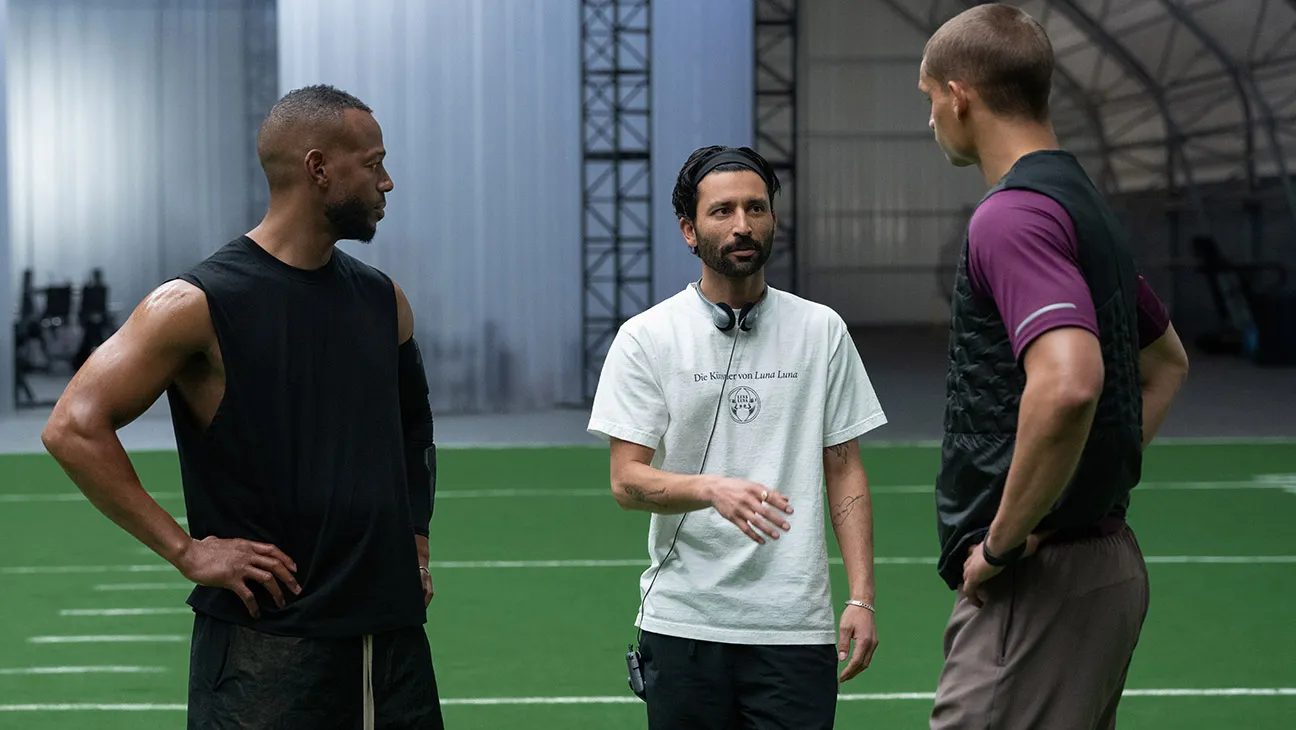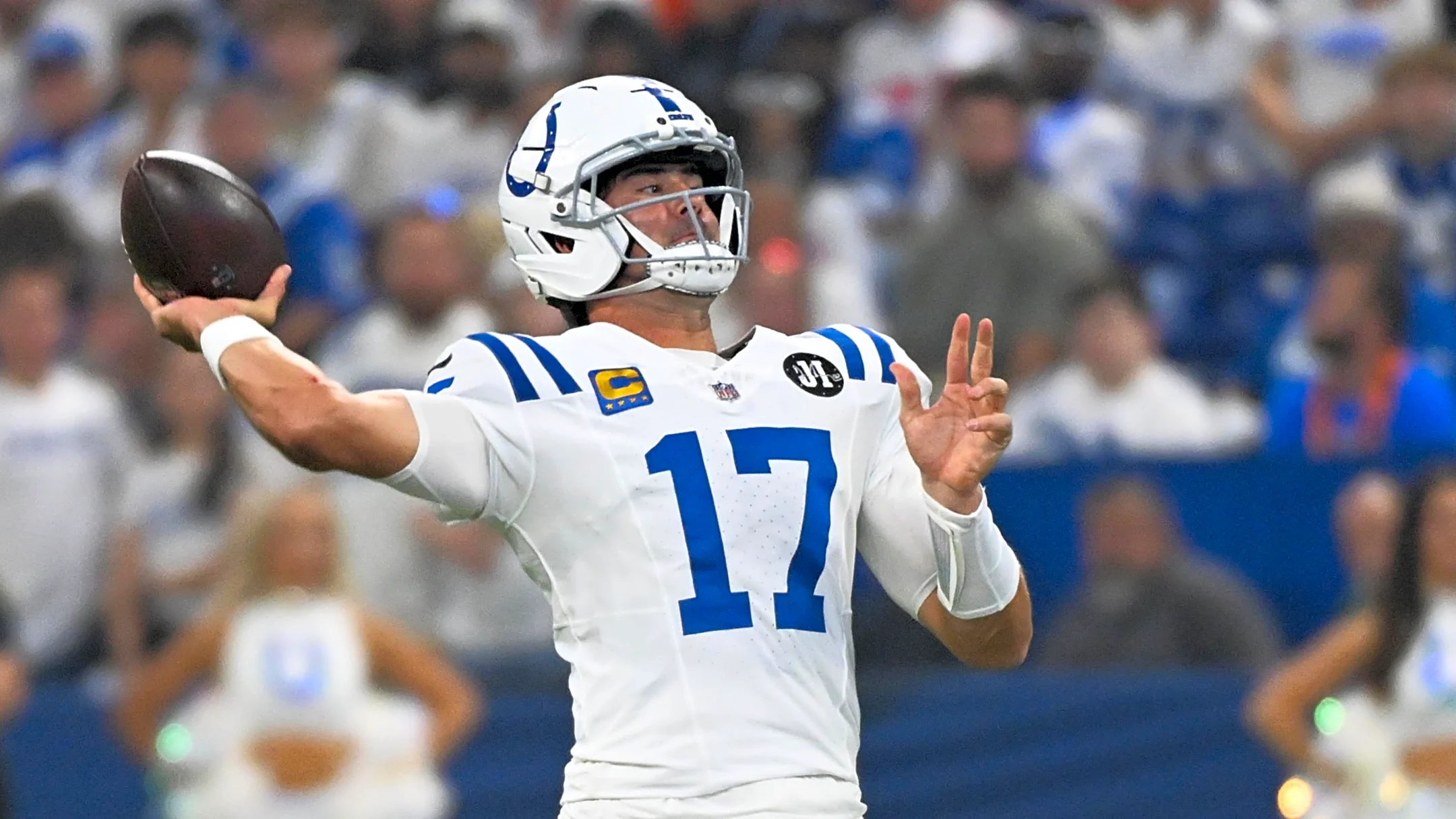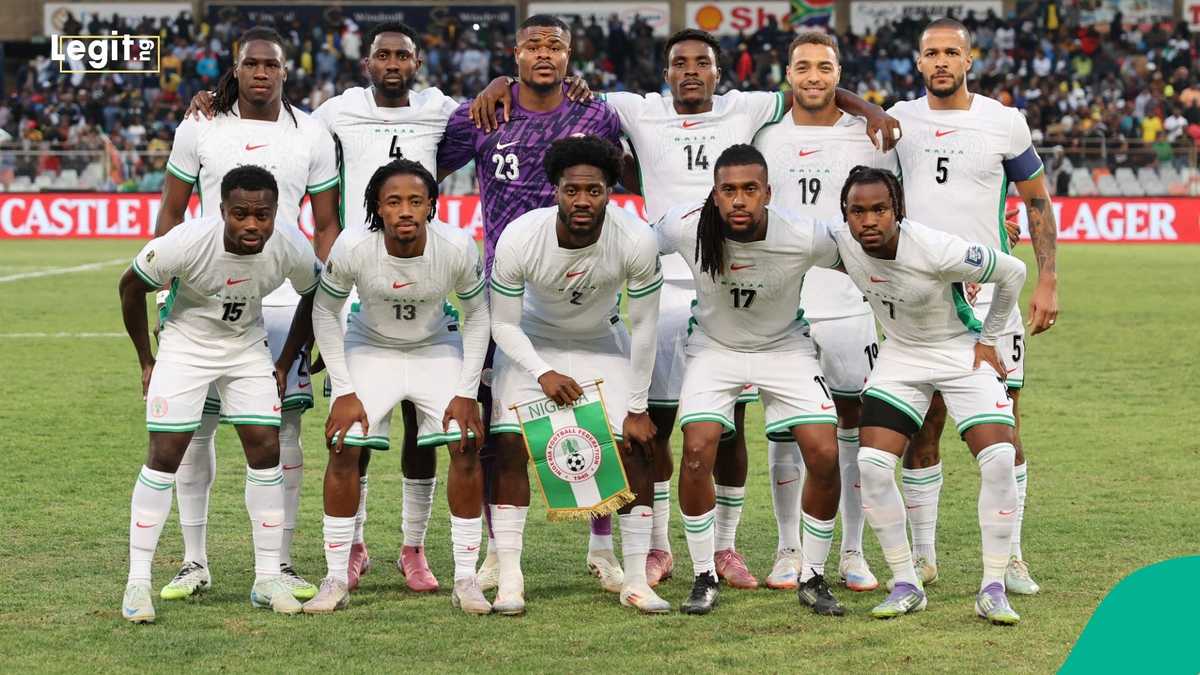
At the turn of the 21st century, Justin Tipping was on his way to a movie theater when he was jumped by ten kids for his Nike sneakers. That seminal event during his Bay Area-based adolescence eventually inspired his feature directorial debut, Kicks (2016), which caught the attention of Jordan Peele’s Monkeypaw Productions. A general meeting between Tipping and Peele took place following the latter’s 2018 Oscar win for Get Out’s screenplay, and the two parties bid adieu with the intention of finding the right project to collaborate on someday.
In 2022, Monkeypaw purchased Skip Bronkie and Zack Akers’ spec script that was later retitled from GOAT to HIM, and Tipping was asked to pitch his take on the material. What resulted actually has some shared DNA with Kicks despite being a blend of pro football and psychological horror.
In Tipping’s debut, an undersized teenager finally fulfills his dream of acquiring some retro Air Jordans for the style points and status they’ll provide him, however, he’s immediately beaten and robbed of his prized “kicks.” Similarly, HIM begins with generational quarterback prospect, Cameron “Cam” Cade (Tyriq Withers), on the verge of achieving his own lifelong dream until he’s suddenly blindsided by an attacker. He’s left with brain trauma and an uncertain future in professional football.
Then, Cam’s football idol, Isaiah White (Marlon Wayans), extends him a lifeline, specifically an invitation to train at his own private compound. Nearing the end of his career, White is considered the GOAT (Greatest of All Time) among quarterbacks, having attained eight championship rings, a number that is purposefully one more than the consensus real-life GOAT, Tom Brady. Thus, if Cam earns Isaiah’s stamp of approval, his murky draft status after missing the professional scouting combine will fade away in lieu of being named Isaiah’s “heir apparent” for the fictional San Antonio Saviors.
Tipping — who, prior to HIM, was a contender for Marvel Studios’ Shang-Chi and the Legend of the Ten Rings — was coming off a steady output of television at the time of his HIM pitch. And his eventual hiring led him to confront his post-Kicks life in his rewrites of the script.
“My first TV show was my first actual paid directing gig after Kicks, and on the first day, I got a call that my father died unexpectedly. It changed everything. It was horrible,” Tipping tells The Hollywood Reporter. “But I was back on set in two weeks. I didn’t stop working. So I was physically burnt out [around 2022]. It inspired my [take on the HIM] story, and I saw the correlation between filmmakers and quarterbacks. There’s that question of, ‘How much do you sacrifice until you no longer recognize yourself?’”
HIM ultimately explores the cost of greatness and whether it’s too high in athletics or any walk of life. Cam, who hasn’t fully recovered from the loss of his football-obsessive father, realizes that the quarterback they both admired is not what has been advertised. Wayans effortlessly sells the sinister side of the veteran QB’s nature, and it’s easily the actor’s finest dramatic outing since 2000’s Requiem for a Dream.
A few months before the release of Darren Aronofsky’s revered psychological drama, Wayans starred in the horror parody, Scary Movie, which happened to be the very film that teenage Tipping was on his way to see when he was pounced for his shoes. Tipping then relayed his traumatic story in a letter to Wayans during his efforts to woo him into accepting the role of Isaiah White.
“He absolutely said the most Marlon Wayans thing ever. It was something along the lines of, ‘Welp, I’m glad you got your ass beat because here we are.’ So I am glad too,” Tipping says mid-laugh.
Below, during a recent conversation with THR, Tipping also discusses the manner in which he captured the downside and risk of professional football, before comparing the pursuit of greatness among athletes and actors.
***
I’ve only seen HIM once, but there’s a lot of disturbing, unsettling imagery that lingered for the rest of my day. Knowing that you’ve seen it hundreds of times, are you alright? Are you still of sound mind?
(Laughs.) I’m alright now. It was an interesting development process, that’s for sure. I definitely went to some dark places.
Monkeypaw bought this script in 2022, and while they’d been looking to work with you since Kicks (2016), I’m assuming you still had to pitch your take on it. What was the key to winning hearts and minds?
When I came in and found [the script] as it was, I had a take that essentially reframed what was already working between the two main characters and their dynamic as these two binary stars that feed off each other through the film. And that reframe was both the lore and mythology and what we’re saying with it.
The body horror was already there. It’s baked into the DNA of the game itself. So I came in with how it was created and how it’s modeled after the military. I referenced Full Metal Jacket and Apocalypse Now when talking about the emotional arcs of the characters. And they were like, “What!?” (Laughs.) It had nothing to do with horror, but that’s what I wanted to do with the characters.
To service the sports and horror audiences at the same time, on the heels of the game’s body horror, I leaned into the psychohorror opportunities. I talked about The Shining and Jacob’s Ladder. I also talked about Black Swan and Suspiria, but Alien is my favorite horror movie. So the groundwork was already laid out, and it is essentially Nosferatu too. I then talked about the psychology of an athlete and what it takes to be that regimented and how difficult it is to be at that level.
What was your headspace at that point?
In my own personal experience, I was burnt out at the time. I had done Kicks, and then I did years of television. My first TV show was my first actual paid directing gig after Kicks, and on the first day, I got a call that my father died unexpectedly. It changed everything. It was horrible. But I was back on set in two weeks. I didn’t stop working; I worked through COVID. So I was physically burnt out [around 2022], and there is that connection in the movie. It inspired my [take on the HIM] story, and I saw the correlation between filmmakers and quarterbacks.
The specificity of these quarterbacks revealed something universal. Whatever your craft is, there’s that question of, “How much do you sacrifice until you no longer recognize yourself? What do you lose? How many weddings or parties or birthdays do I miss?” Professional athletes like LeBron talk about this too. You miss out on things in order to take on the role, and that psychology felt very, very ripe for creative opportunities. So I pitched the visual opportunities, and the fun and mischief we could have, while still being motivated. It was not just for the sake of having a mascot take a hammer to [Cam’s] brain so blood could splatter on the lens.
I came in with something that I had a personal connection to, and Monkeypaw and Jordan [Peele] always look for that deeper sociopolitical take or social critique about what is being examined. I told them, “I am fascinated with what happens if we make this a Faustian cautionary tale. When the athlete becomes a commodity and a warm body to an institution, what if that’s the haunting? What if we’re taking that and pushing it to extremes?”
Viewers are probably going to read HIM as an indictment of professional football. It illustrates the physical and mental toll their players endure, not just during their playing careers, but for the rest of their lives. You even incorporate thermal imagery to show how the brain and body react to a concussion. Are you trying to sound the alarm?
I don’t think I had to sound an alarm. The alarm has already been sounded. I talked to athletes about this, and the game is the game. It can be joyful and beautiful and all those things. Boxing, free solo [rock climbing], whatever it is, people, even knowing the risks, are still going to do it. That’s what humans do. But it’s the business around it that gets insidious. [Note: Tipping’s film thanked retired football players, Tony Gonzalez and LeSean McCoy, in the credits, so they were likely two of the athletes who provided the aforementioned insight.]
I basically just [consumed] a lot of things that were already put out in the world — the Washington Post or New York Times or ESPN’s 30 for 30 docs — about all of the injuries and potential risks of the game. The choice to show that [thermal] imagery, people only respond to blood. These guys are basically getting into car wrecks every week, and then they recover to get into another car wreck. But you don’t see the toll that takes if you don’t see blood. People are like, “Just get up and keep going.” So it was motivated by showing what it’s like to get a cracked rib or what it’s like for the brain to shake from a hit.
So it was taking on what I had already been introduced to and absorbed in the development process. I knew, but I didn’t know. A couple articles later, I was like, “Oh, wow.”
I thought of this question moments before HIM literally referenced Timothée Chalamet. But during awards season last year, he gave a SAG Awards victory speech where he said, “I’m really in pursuit of greatness. I want to be one of the greats.” And it generated a bit of controversy as some people felt it was arrogant. And yet when an athlete expresses that same sentiment, nobody bats an eyelash. What do you make of that incongruity?
That’s a great question. I didn’t take what he was saying as arrogant. I actually thought that he was speaking to a generation. If he’s speaking to his generation, there’s been a hyper focus with social media and TikTok to be like, “I don’t care.” It’s to protect oneself from being judged or trying too hard. That means you can’t try, otherwise, you are exposing yourself to being made fun of. So I interpreted that as, “No, I just want to be the best at what I do. I don’t take it lightly. I don’t take this as some random trophy. I take it seriously.”
So the incongruity might be coming from a place of the myth of meritocracy. In terms of sports, if you do X, Y, Z, it equals this. But the arts are more subjective. You can’t say, “If you just do X, Y, Z, you’ll get this,” when that’s not actually the case. So it’s more about how you personally define greatness, and competing against yourself is probably the healthier way. It’s not about comparing myself to everybody else; it’s about comparing myself to a standard I’ve set.
Your movie also makes a compelling case to never meet your heroes. How have your personal encounters with your own heroes gone?
I don’t have one that would make me say, “Don’t do it.” But something timely right now is the parasocial relationship with celebrity and the difference between supporting somebody and worshiping somebody. So if anyone wants to dissect this movie, I hope there’s a conversation around fandom and parasocial relationships and what happens when it’s not just support, but worship. Anyway, shout-out to Timothée Chalamet. If you ever want to work on a movie … (Laughs.)
How hands-off or hands-on was Jordan Peele as a producer?
He was the right amount of hands. (Tipping pauses for comedic effect.) As a filmmaker himself, there was definitely a lot of room to be free and push it as far as I can. Some of the best times were during the development process. I would get through a draft, and then we’d sit down together to actually page-turn and discuss some things.
It wasn’t like, “Don’t do X, Y, Z.” It was, “What are you going for?” If I was stuck, then he would offer suggestions and say, “Try this.” He’d give me a homework assignment basically. But those were great because I could get as crazy as I wanted. We’d get into these rallies where it was like, “Yes, and …” or, “Ooh, I’ve got this crazy idea.” And then he’d get inspired and be like, “Oh shit, yeah. And what if this ….” Those were some of the most fruitful discussions because they always led to something better.
Making the movie and letting me do my thing, he then waited until I needed a sounding board again during the cut. I was like that Charlie Day meme during the last scene. I was like, “What the heck do I do?” I was calibrating beat by beat. I was just trying to land the plane, and I was like, “Oh my gosh, there’s one-too-many Tim Heidecker dick jokes. It’s too funny, and now we’re missing the violent thing.”
So he came in, and I would be my go-crazy neurotic self. He would watch from that place and be like, “Well, have you tried this, this and this?” We’d go through a round of his notes and see where we met. So I don’t think I could get away with a lot of this stuff unless someone of Jordan Peele’s caliber had my back.
You’ve had a traumatic history with the oeuvre of Marlon Wayans. A real-life assault and theft of your sneakers inspired your first movie, Kicks, and it took place while en route to see Marlon’s Scary Movie (2000). Amazingly, you didn’t let it stop your teenage self from attending the screening. Did you tell Marlon this story during your first meeting?
I actually wrote him a letter that told him the story, and he absolutely said the most Marlon Wayans thing ever. It was something along the lines of, “Welp, I’m glad you got your ass beat because here we are.” (Laughs.) It was very Marlon. He just leaned all the way in and laughed. So I am glad too.
I was like, “Your face is seared into my brain because my eyes were swelling as I was watching your performance.” It was a fun thing to reflect on, and I actually forgot about that until I was talking about wanting to go after Marlon. And then I was like, “Oh shit!” [upon remembering].
With a film like Requiem for a Dream on his résumé, he still hasn’t done as much drama as he deserves. Being from a comedy family, he’s always going to be known for that first. Did he ever express any frustration that he hasn’t had more of these dramatic opportunities?
It was more from a place of, “I always know I can do this. I just need the opportunity.” But I never heard any regret or that he wishes something went a different way. He is always consistent and firm. I don’t know what monk-like journey he went through, but he is very do-the-work and that’s it. But he was so excited about this because it was an opportunity he’s never had. So it was definitely a thing he’s been wanting to do, and I’m grateful that he brought it. He really transformed the movie.



